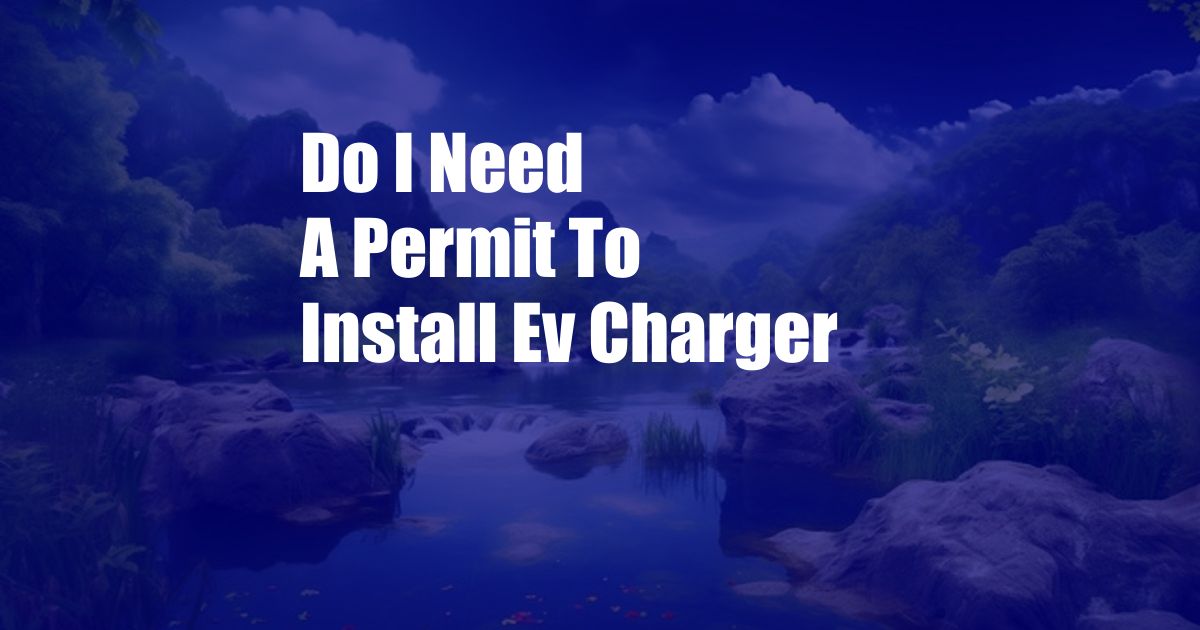
Do I Need a Permit to Install an EV Charger?
Electric vehicles continue to surge in popularity as a sustainable and cost-effective transportation option. As a result, the demand for EV chargers in homes, businesses, and public spaces is skyrocketing. While installing an EV charger may seem relatively straightforward, it’s essential to understand the regulatory requirements involved to ensure compliance and safety.
One of the primary considerations before installing an EV charger is whether a permit is required. The answer can vary depending on several factors, including local building codes and electrical regulations. In this article, we delve into the need for permits, the process of obtaining them, and other essential aspects related to EV charger installations.
Understanding Permit Requirements
In general, most municipalities require a permit for electrical work, including EV charger installations. This permit serves as an official authorization from the local building department that the installation meets all applicable safety and building codes. The purpose is to ensure that the EV charger is installed properly, minimizing electrical hazards and ensuring the safety of the property and its occupants.
Permit requirements vary from one jurisdiction to another. Some areas may have specific exemptions for small-scale EV charger installations, while others may require a permit regardless of the project’s size. It’s crucial to check with the local building department to determine the specific requirements in your area.
The Permit Process
The process of obtaining a permit for an EV charger installation typically involves the following steps:
- Complete an application: Obtain an application form from the local building department and fill it out accurately, providing details about the proposed installation.
- Submit required documents: Along with the application, you may need to submit supporting documents such as a wiring diagram, site plan, and electrical inspection report.
- Pay fees: Most municipalities charge a fee for issuing a permit, which can vary depending on the size and complexity of the installation.
- Inspection: Once the application and supporting documents are reviewed, the building department may conduct an inspection to verify the proposed installation’s compliance with codes.
After the inspection is complete and the installation is approved, the permit will be issued. It’s important to note that the permit process can take several weeks, so it’s advisable to apply well in advance of the planned installation date.
Tips and Expert Advice for EV Charger Installations
In addition to obtaining a permit, there are several tips and pieces of expert advice to keep in mind when installing an EV charger:
- Choose a qualified electrician: It’s highly recommended to hire a licensed and experienced electrician to perform the installation. This ensures that the EV charger is installed correctly and meets all safety standards.
- Consider the electrical capacity: Before installing an EV charger, make sure your electrical panel has sufficient capacity to handle the additional load. If necessary, an electrician can upgrade the electrical panel to meet the increased power demand.
- Choose the right EV charger: There are various types of EV chargers available, each with different charging speeds and capabilities. Select a charger that suits your specific needs and vehicle requirements.
- Follow the manufacturer’s instructions: Carefully read and follow the manufacturer’s instructions for installing and operating the EV charger. This helps ensure proper installation and safe usage.
- Consider accessibility: Place the EV charger in a convenient and accessible location, ensuring it’s easy to plug in and disconnect the vehicle.
By following these tips, you can help ensure a safe and successful EV charger installation. It’s also advisable to consult with a local electrician or the manufacturer of the EV charger for specific guidance and advice.
FAQs on EV Charger Installations
Here are some frequently asked questions related to EV charger installations:
- Q: Is it mandatory to have a permit for all EV charger installations?
A: Permit requirements vary by municipality. Contact the local building department to determine the specific regulations in your area. - Q: What are the consequences of installing an EV charger without a permit?
A: Installing an EV charger without a permit may result in fines, penalties, or delays in the project’s completion. - Q: How long does the permit process typically take?
A: The permit process can take several weeks, depending on the complexity of the installation and the workload of the building department. - Q: What is the average cost of installing an EV charger?
A: The cost of installing an EV charger varies depending on factors such as the type of charger, the electrical work required, and the local labor rates. - Q: Are there any incentives or rebates available for installing EV chargers?
A: Many states and municipalities offer incentives, rebates, and tax credits to encourage the adoption of EVs and the installation of EV chargers.
Conclusion
Understanding the need for permits and the installation process for EV chargers is crucial for safe and compliant installations. By following the guidelines outlined in this article and consulting with local authorities and qualified electricians, you can ensure a successful EV charger installation that will meet your needs and enhance the convenience and sustainability of your electric vehicle ownership.
If you’re considering installing an EV charger, we encourage you to explore this topic further by reading additional resources, speaking with professionals, and researching local regulations. By staying informed and taking the necessary precautions, you can contribute to the growing adoption of electric vehicles and support the transition towards a cleaner and more sustainable future.